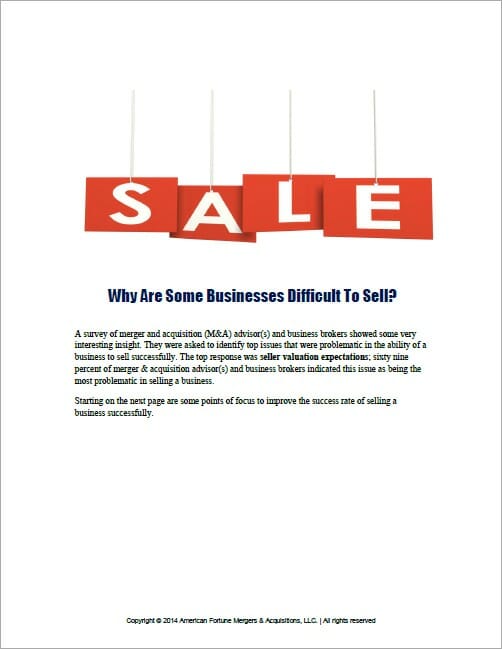 How to Value a Business
How to Value a Business
Business value can be problematic if the same valuation is intended to be used for two or more different purposes. In determining the business value for the purpose of exit planning and selling a company or attracting outside investment capital may contain speculative elements based on future potential that may be acceptable to a risk oriented investor but not acceptable to a court charged with determining value of a business under some set of statutory standards and legal precedents. A good portion of determining the correct value is knowing the receiver and or buyer group and trying to understand how they perceive risk and expected return for a investment. So therefore part of determining business value relies on subjective factors to attempt to analyze and understand the value in the eyes of a group of beholders for a given business.
Premise of Value (Worth) Appraisal
Virtually all business or interests in businesses may be valued under each of these following four alternative premises of value (worth) :
1. Valuation of a business as a going concern. Worth of a Business in continued use, as a mass body of income producing assets, and as a going-concern business enterprise.
2. Valuation of a business as a body of assets. Worth of a Business in place, as part of a mass group of assets, but not in current use in the production of income, and not as a going-concern business enterprise.
3. Valuation of a business as an orderly disposition. Worth of a Business in exchange, on a piecemeal basis (not as part of body of assets), as part of an orderly disposition. This premise is based on the fact that all of the assets of the business enterprise will be sold individually and that they will experience normal market exposure.
4. Valuation of a business as a forced liquidation. Worth of a Business in exchange, on a piecemeal basis (not part of a group of assets), as part of a forced liquidation. This premise contemplates that the assets of the business enterprise will be sold individually and that they will experience less than normal exposure in an open marketplace.
While virtually any business enterprise may be valued under each of the four fundamental premises, a conclusion is reached under each premise, for the same business, may be dramatically different.
Each of the business valuation premises appraisal may apply under the same standard, or definition, of value. For example, the fair market appraisal value standard calls for a “willing buyer” and a “willing seller.” Yet, these willing buyers and willing sellers have to make an informed economic decision as to how they will transact with each other with regard to the subject business. In other words, is the subject business have more value (worth) to the buyer and the seller as a going concern that will continue to operate as such or as a collection of individual assets to be put to separate uses? In either case, the buyer and seller are still “willing.” So in both cases, they have concluded a set of transactional circumstances that will maximize the value appraisal of the collective assets of the subject business enterprise.
In valuing a business the valuation expert selects the appropriate premise and methods of value appraisal is an important step in defining the valuation scope. Typically, in controlling ownership interest, how the appropriate premise and methods of value appraisal is selected is a function of the highest and best use of the collective assets of the subject business enterprise. The decision to use the appropriate valuation premise and how methods of valuation are selected is usually a decision made by the valuation appraisal expert, based upon their valuation knowledge, valuation standards and guidelines, experience, judgment, and analysis.
There are times, however, when the decision regarding the appropriate premise and methods of valuation is made for the business value appraisal expert. How does this take place? This occurs when the business appraisal expert knows-or is told-that the subject business enterprise will, in fact, be continued as a going concern or will be sold in a certain set of transactional circumstances. For example, if the business assets are, in fact, going to be sold on a value (worth) in exchange basis, it is not relevant for the appraisal expert to consider the business value in continued use-or going-concern-premise of value.
Call American Fortune Business Valuation Services with any valuation questions at 800-248-0615.
How To Increase Business Value
The term Business Value refers to all forms of value that determine the health and success of a business in comparison to other businesses and using the marketplace as a reference of the valuation of a business.
So how can a business owner increase business worth in addition to increasing revenue? If profit isn’t the only factor that contributes to a business’s value (worth), what else can be done to increase the value of a business (worth)?
Developing and monitoring certain strategies will not just increase revenue but also increase the valuation of a business. Effects take time so it’s smart to start planning and building value (worth) very early on in the early stages of the business.
Value drivers reduce the risk of owning the business and or increase the probability that the business will grow. If these characteristics are present in a business, a buyer will see more value in such a business and will be open to paying a premium price.
Sixteen Proven Opportunities To Increase a Business Valuation
1. Increasing Business Worth in a Management Team: Many business owners make the mistake of retaining complete control, which makes it hard to separate them from the business. Designating a manager or assembling a management team that is capable of running the business now and after the departure of the owner.
2. Increasing Business Worth in Systems and Procedures: Reliable systems and well-documented procedures will help sustain the growth of a business and ensure a smooth transition to a new owner. Create a business plan, job descriptions and systems manuals.
3. Increasing Business Worth in Customers and Suppliers: A business has greater value (worth) when it is protected from the loss of a single customer or dominant supplier; diversifying the customer and supplier base will increase business value by reducing risk. No one customer should account for more than 20% of your total sales. Also, take time to review suppliers this process may reduce the cost of goods.
4. Increasing Business Worth in Facilities and Equipment: Make sure the facilities are up to code. Invest in new equipment and maintenance and service records.
5. Increasing Business Worth in Financial Disciplines: Much of the value of a business (worth) is based on the health of historical income statements and the businesses ability to have healthy and realistic projections. Therefore financial records need to be accurate and verifiable.
6. Increasing Business Value (Worth) in Growth Strategy: The ability to demonstrate a realistic growth strategy is vital to the perceived market value (worth) of a business. Creating a realistic pro-forma statement with projected discretionary earnings will communicate future opportunities.
7. Increasing Business Value (Worth) in Profitability Analysis: First step is to have solid value (worth) appraisal performed by an expert valuation appraisal expert. The appraisal should present a realistic market value (worth) of a business. The appraisal should help the business owner understand some of their business’s value (worth); the next step should be to perform profitability analysis drivers. This starts with understanding where the money is made and where the money is lost. Finally, perform a SWOT analysis. This analysis will help identify how the company’s true strengths, known weaknesses, growth opportunities and threats to the future of the business can help in shaping its value (worth)
8. Increasing Business Brand (Worth) Value: Establish and nourish the business’s brand in the marketplace. Learn how brand awareness can have a substantial increase in business value (worth).
9. Increasing Business Value (Worth) of an Operations Manual: Develop and maintain an operations manual. Put systems into place that will let a business operate and grow in the absence of the owner.
10. Increasing Business Value (Worth) in having Current and Accurate Financials: Be vigil in keeping your books current; showing accurate, clearly identified and consistent records. (Remember, besides it ultimately making you more successful, a potential buyer or auditor might be looking at them any day.)
11. Increasing Business Value (Worth) of Reputation: Expand individual client lists, networking sources, and especially protect the business’s reputation. The reputation of the business owner and the reputation of the business are very often treated as being one and the same.
12. Increasing Business Value (Worth) of Intellectual Property: Take care of intellectual property: trademarks, patents, etc. Very often buyers will place significant emphasis on patents and trademarks.
13. Tax issues: Any outstanding tax and or liabilities issues should be taken care of ASAP.
14. Increasing Business Value (Worth) of a Business Plan: Update and follow a business plan weekly or monthly as well as fine-tuning future projections. Maintain a business plan as if a buyer might walk in the door any day with a large offer but first wanted to review the business plan.
15. Increasing Business Value (Worth) of a Business Appraisal: Have a qualified business appraisal expert perform a detail valuation analysis and prepare a realistic picture of the worth of the business through the eyes of would-be buyers. The worth of a business is derived from objective and subjective value drivers. Although subjective value drivers are difficult to quantify they often present the greatest opportunity to increase the value (worth) of a business.
16. Increasing Business Value (Worth) of Cash Flow: One of the big players of value (worth) is cash flow. Cash flow determines a business’s rate of return of value and net value, as well as a business’s level of liquidity.
Learn How to Value a Business with a “Valuation Flow Analysis Assessment”
Valuation flow assessment analyzes value creation at the business level. Valuation flow analysis assessment identifies the activities of a business and then studies the economic implications of those activities. It includes four steps:
1. defining the strategic business unit
2. identifying critical activities
3. defining products or services
4. determining the value of an activity
The main questions that the value flow assessment addresses are as follows: what activities should continue to perform and which and how activities need to be modified and how? and what is the configuration of the business’s activities that would enable it to add value to the product(s) or service(s) and to successfully compete in its industry? Value flow analysis assessment explores the primary activities, which have a direct impact on value creation, and support activities, which affect value only through their impact on the performance of the primary activities. Primary activities involve the creation of physical products or services and include logistics, operations, marketing and sales, and service.
Value (worth) can be created by differentiation along every step of the value flow, through activities resulting in products and services that lower buyers’ costs or raise buyers’ performance. Drivers of product differentiation, and hence sources of value (worth) creation, are policy choices (what activities to perform and how), linkages (within the value flow or with suppliers and channels), timing (of activities), location, sharing of activities among business units, learning, integration, scale and institutional factors.
Valuation flow analysis assessment can be helpful in examining value (worth) creation in markets. For example, Amazon.com decided to build its own warehouses in order to increase the speed and reliability of the delivery of products ordered online. By doing so, it was able to add value to sales and fulfillment activities.
Valuation flow assessment includes a sequence of gathering, organizing, selecting, synthesizing, and distributing information. Value (worth) creation opportunities in a business may result from new combinations of information, physical products and services, innovative configurations of transactions, and the reconfiguration and integration of resources, capabilities, roles, and relationships among suppliers, partners, and customers.
Business Valuation Reports By American Fortune Business Valuation Services
We offer 3 types of business valuation services:
Value Estimate: This report is specifically designed for business owners to provide a fast and easy estimate of value for a business. The report is based on a combination of 8 valuation methodologies, a comparative data that help verify the estimate of value. Based on these methods and data an approximate value of a business is configured via a customized 38-page report. This report is not a professional valuation of a business and is not suitable for use in estate planning, divorce proceedings, buy-sell agreements, ESOP’s, IRS issues, or legal proceedings. Price: $1,250. To view a sample Value Estimate report – Request Sample
Calculation of Value: This business valuation report takes basic value drivers to produce a semi-formal valuation. It utilizes four to five valuation methodologies. This type of valuation yields a moderately defensible valuation report. The report is 30-35 pages. Price: $2,300. To view a sample Calculation of Value – Request Sample
Comprehensive Business Valuation: A comprehensive business valuation that incorporates broad and complex business reviews, financial reviews and analysis. This valuation is very defensible. It utilizes seven to ten valuation methodologies. This valuation is very accurate and very defensible. The report is 40-50 pages. Price: $4,000. To view a sample Comprehensive valuation – Request Sample
American Fortune Business Valuations follow the requirements as defined by the American Institute of Certified Public Accountants Statement on Standards for Valuation Services No. 1 (SSVS No. 1)and performed in accordance with the Uniform Standards of Professional Appraisal Practice (USPAP) as promoted by the Appraisal Foundation and the International Valuation Standards (IVS).
To learn more about business valuations and and how to increase business worth as well as additional information about American Fortune’s business valuation services Learn more.
We at “American Fortune Business Appraisal Services” have provided our clients valuation reports , increased business worth in all areas of the USA


 How to
How to



